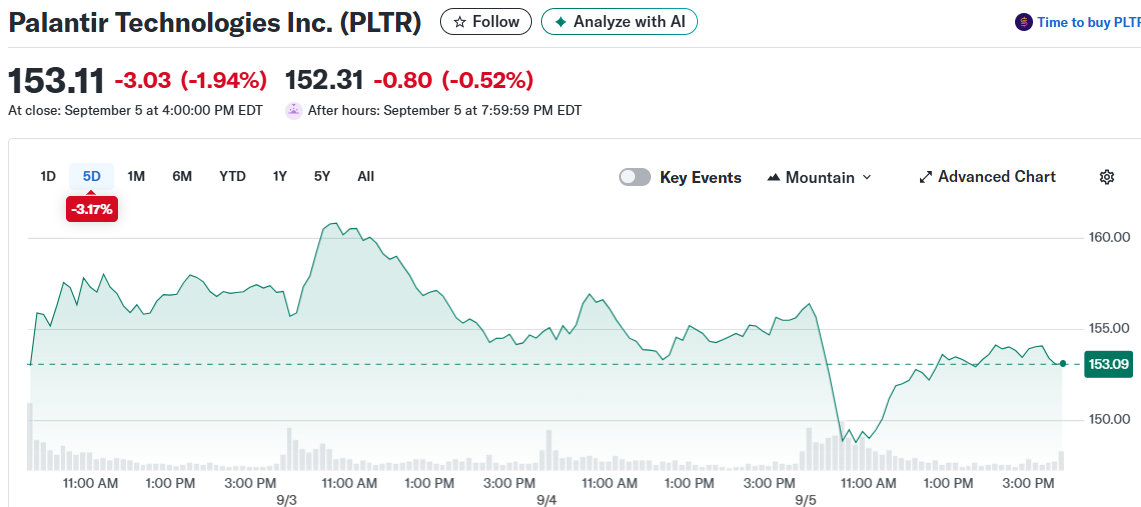Palantir Technologies stock closed down 4% on Friday after falling as much as 5.2% during intraday trading. The artificial intelligence software company’s shares faced pressure from multiple factors.

The Bureau of Labor Statistics released disappointing August employment data. Only 22,000 jobs were added during the month. This fell well short of the 75,000 jobs economists had expected.
The weak jobs report initially boosted markets on hopes for Federal Reserve rate cuts. However, concerns about economic health quickly overshadowed any optimism. Investors began worrying that the data signals broader economic weakness.
This is absolutely insane:
The US just revised the June jobs report lower for a SECOND time for a total of -160,000 jobs.
Now, the US has officially LOST -13,000 jobs in June, the first negative month since July 2021.
What just happened? Let us explain.
(a thread) pic.twitter.com/wspqT3UQjB
— The Kobeissi Letter (@KobeissiLetter) September 5, 2025
President Trump added another layer of uncertainty during a Silicon Valley CEO dinner. He announced plans for “fairly substantial” tariffs on semiconductors. Companies that refuse to move production to the U.S. would face these levies.
While Palantir doesn’t make chips directly, the tariffs could affect inference costs. Higher chip prices might squeeze margins for AI companies that rely heavily on computing power. The details of Trump’s tariff plan remain unclear.
Recent insider stock sales also weighed on Palantir’s share price. Three company insiders filed disclosures with the Securities and Exchange Commission.
Board member Jeffrey Buckley sold 2,803 shares with the earliest transaction on August 29. Board member Alexander Moore sold 20,100 shares on September 2.
Chief Financial Officer David Glazer made the largest transactions. He exercised stock warrants on September 2 to buy 37,770 shares at $4.72 each. However, he then sold 81,000 shares across eight separate transactions that same day.
Insider selling doesn’t always indicate problems with a company. But the timing appeared to add to investor concerns about Palantir’s valuation.
The broader market also struggled on Friday. The S&P 500 fell 0.5% while the Nasdaq Composite dropped 0.2%. Tech stocks faced particular pressure as investors digested the economic data.
Palantir’s stock has been volatile in recent months. The company’s high valuation makes it sensitive to any negative news or economic uncertainty.
The weak jobs data raised questions about recession risks. A slowing economy could hurt demand for Palantir’s government and commercial software services.
Rate cuts typically help growth stocks like Palantir by making borrowing cheaper. However, if cuts come because of economic weakness rather than inflation control, the benefits may be limited.
Palantir’s business model relies on consistent growth to justify its premium valuation. Any signs of economic trouble create additional pressure on the stock price.
The company has built its reputation on data analytics and AI capabilities. Government contracts provide stable revenue, but commercial growth drives the stock’s momentum.
Recent quarters have shown strong performance, but investors demand perfection given the high valuation multiples. Even minor disappointments can trigger sharp selloffs.
Friday’s decline reflects these valuation concerns combined with macro economic worries. The jobs data and tariff announcements created a perfect storm of negative sentiment.
CFO David Glazer’s decision to exercise warrants and immediately sell shares on September 2 represents the most recent insider activity disclosed to the SEC.
The post Palantir Technologies (PLTR) Stock: Falls 4% on Weak Jobs Data, Insider Selling, and Tariff Worries appeared first on CoinCentral.
Also read: Crypto Weekly Roundup: Top News and Market Shifts